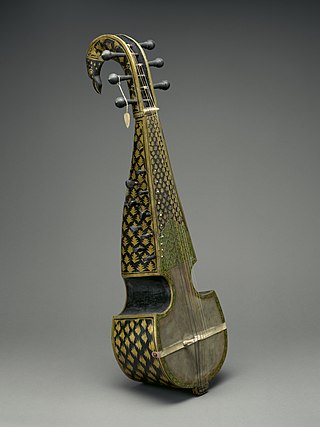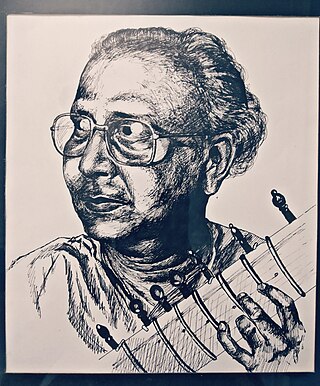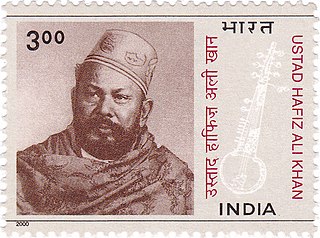Related Research Articles

The sarod is a stringed instrument, used in Hindustani music on the Indian subcontinent. Along with the sitar, it is among the most popular and prominent instruments. It is known for a deep, weighty, introspective sound, in contrast with the sweet, overtone-rich texture of the sitar, with sympathetic strings that give it a resonant, reverberant quality. A fretless instrument, it can produce the continuous slides between notes known as meend (glissandi), which are important in Indian music.

Ali Akbar Khan was an Indian Hindustani classical musician of the Maihar gharana, known for his virtuosity in playing the sarod. Trained as a classical musician and instrumentalist by his father, Allauddin Khan, he also composed numerous classical ragas and film scores. He established a music school in Calcutta in 1956, and the Ali Akbar College of Music in 1967, which moved with him to the United States and is now based in San Rafael, California, with a branch in Basel, Switzerland.

Shahjahanpur is a municipal corporation, town and district headquarters of Shahjahanpur District in Uttar Pradesh, India.

Allauddin Khan, also known as Baba Allauddin Khan was an Indian sarod player and multi-instrumentalist, composer and one of the most notable music teachers of the 20th century in Indian classical music. For a generation many of his students, across different instruments like sitar and violin, dominated Hindustani classical and became some of the most famous exponents of the form ever, including Ravi Shankar and Ali Akbar Khan.

Pandit Nikhil Ranjan Banerjee was an Indian classical sitarist of the Maihar Gharana. Along with Pandit Ravi Shankar and Ustad Vilayat Khan, he emerged as one of the leading exponents of the sitar. He was a recipient of the Indian civilian honour of the Padma Bhushan.
Imrat Khan was an Indian sitar and surbahar player and composer. He was the younger brother of sitar maestro Ustad Vilayat Khan.

Radhika Mohan Maitra (1917–1981) was an Indian sarod player and the guru of Narendra Nath Dhar, Kalyan Mukherjea, Buddhadev Das Gupta, Sanjoy Bandopadhyay, Abanindra Maitra, Pranab Kumar Naha, Samarendra Nath Sikdar, Michael Robbins, and many other musicians of this generation. Maitra was considered an influential figure in 20th century sarod playing and received the title Sangeetacharya. He was among those awarded the Sangeet Natak Akademi Award in 1971.

Hafiz Ali Khan (1888–1972) was an Indian sarod player. A fifth-generation descendant of the Bangash gharana of sarod players, Hafiz Ali was known for the lyrical beauty of his music and the crystal-clear tone of his strokes. The occasional critic has, however, observed that Khan's imagination was often closer to the semi-classical thumri idiom than the austere dhrupad style prevalent in his times. He was a recipient of the civilian honour, the Padma Bhushan Award, in 1960.
Kalyan Kumar Mukherjea (1943–2010) was an authority on Indian classical music, particularly the Senia Shahjahanpur Gharana (school) of Sarod. He was also a mathematician.

Pandit Nayan Ghosh is an Indian Tabla and Sitar maestro. He is a tabla player from the Farrukhabad Gharana.
Sumati Mutatkar was an Indian classical music vocalist and musicologist from the Agra gharana of Hindustani classical music, and a Professor of Department of Music in University of Delhi.
Pandit Shankar Ghosh was an Indian tabla player from the Farukhabad gharana of Hindustani classical music. He was an occasional Hindustani classical singer where he followed the Patiala gharana.

Pandit Anindo Chatterjee is an Indian tabla player of the Farukhabad gharana school. He was born into a musical family. Chatterjee is a disciple of Pandit Jnan Prakash Ghosh.

Debasis Chakroborty is an Indian classical slide guitar player from Senia-Maihar Gharana.
Phuljhuri Khan was a tabla and esraj player from Bangladesh. He was also an accomplished sanai, sitar, and pakhawaj player.

Pandit Biswajit Roy Chowdhury is a Hindustani classical musician and a renowned sarod player from India.
Ustad Sakhawat Hussain Khan or Sakhawat Hussain (1877–1955) was a virtuoso Indian sarod player, a contemporary of Hafiz Ali Khan and one of the major exponents of the instrument in the 20th century.

Swara Samrat festival is a four-day annual festival of Indian classical music and dance held during the winters in Kolkata, India. This festival is the brainchild of Sarod maestro Pandit Tejendra Narayan Majumdar, his vocalist wife, Manasi Majumder and their Sarod player-son Indrayuddh Majumder. The festival is dedicated to Swara Samrat Ustad Ali Akbar Khan. Indian Classical Music and Dance Legends such as Pandit Shivkumar Sharma, Pandit Birju Maharaj, Pandit Hari Prasad Chaurasia, Pandit Jasraj, Ustad Zakir Hussain, Ustad Aashish Khan, Dr. Girija Devi, Begum Parveen Sultana, Pandit Swapan Chaudhuri, Guru Karaikudi Mani, Ustad Rashid Khan, Shankar Mahadevan, Pandit Budhaditya Mukherjee, Pandit Ulhas Kashalkar, Pandit Venkatesh Kumar, Pandit Ajoy Chakraborty, Pandit Anindo Chatterjee, Pandit Sanjay Mukherjee, Ustad Shahid Parvez, Ustad Shujaat Khan, Pandit Tejendra Narayan Majumdar, Pandit Kushal Das, Pandit Rajendra Gangani, Guru Sujata Mohapatra, Pandit Subhankar Banerjee, Pandit Yogesh Samsi, Pandit Bickram Ghosh, Pandit Tanmoy Bose and Kaushiki Chakraborty are some of the artists who have previously performed in this festival.

Abhisek Lahiri is an Indian classical sarod player with training in the three major gharanas of sarod which are Shahjahanpur, Maihar gharana, and Senia Bangash (Gwalior) from his father and guru Pt. Alok Lahiri. Primarily he belongs to the Maihar gharana

Acharya Radhika Prasad Goswamy, known as Sangeet Nayak, was an Indian vocalist in the Hindustani classical tradition, based in the Bishnupur Gharana.
References
- ↑ Suryanarayanan, Renuka (22 November 2018). "'Raag appeals more to Chennai rasikas,' says Sarod artiste Arnab Chakrabarty". The Hindu . Retrieved 25 May 2019.
- ↑ "Buddhadev Dasgupta (1933–2018): A 'renegade pupil' explains why the sarod master was a true pioneer". Scroll.in . 17 January 2018. Retrieved 2 August 2021.
- ↑ "Strings Attached: My Journey as a Modern Sarod Player". Scroll.in . Retrieved 2 August 2021.
- ↑ Rahn, John; Khan, Ustad Imrat (1992). "An Interview with Ustad Imrat Khan". Perspectives of New Music . 30 (6): 126–145. doi:10.2307/3090630. JSTOR 3090630.
- ↑ "In Kolkata, the inheritor of the Lucknow-Shahjahanpur gharana is trying to keep its legacy alive". Scroll.in . Retrieved 25 May 2019.
- ↑ "Arnab Chakrabarty". Eternally Art. Retrieved 25 May 2008.
- ↑ "Star Spot". The Telegraph . Kolkata. 22 April 2003. Archived from the original on 1 May 2003.